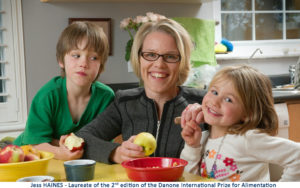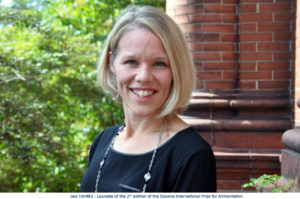DIPA 2nd edition award
Dr. Jess Haines: laureate of the 2nd edition of DIPA
Dr. Jess Haines, Associate Professor at the University of Guelph, Canada, is awarded the Danone International Prize for Alimentation (DIPA) for her groundbreaking research into promoting sustainable healthy eating among families, through novel, interdisciplinary research and knowledge mobilization.

The award-winning research helps build sustainable healthy eating habits among families.
This pioneering research could form the foundations for new advices on promoting healthy and sustainable eating in families and children.
“To preserve the health of our planet, and our own health, we need to identify effective strategies that support consumers to eat a sustainable healthy diet and reduce also food waste” – Jess Haines
Download the press kit :
Award ceremony and lecture, June 2021
The Award ceremony and lecture was organized during the ASN Nutrition Online Preconference Week, on 3rd of June 2021.
The lecture is now available online; with :
- Introduction by Prof. Olivier Goulet, president of the Danone Institute International
- Introduction by Dr. Nicolas Gausseres, VP Health Danone
- Award ceremony by Prof. Luis Moreno, president of the jury of the Danone International Prize for Alimentation 2020
- Lecture by Dr. Jess Haines, laureate of the DIPA 2020
- Q&A sessions chaired by Suzanne Higgs (University of Birmingham, UK)
Bridging research findings and practical guidance for families for a more sustainable healthy diet.
After years of work on family-based healthy eating interventions, Dr. Haines has expanded her research to focus on sustainable healthy diets. The overarching goal of Dr. Haines’s research is to identify strategies to promote and encourage sustainable healthy eating habits among families that support the health of the people and the health of the planet.
To do this, she bridges epidemiologic and observational research on the determinants of eating behavior with novel and scalable behavior change interventions and knowledge mobilization tools. Dr. Haines’s uses interdisciplinary research approaches to create interventions and tools for real, lasting change that benefits the health of families and children.
Concretely, food waste is a global concern with important economic, environmental, and nutritional consequences. Vegetables and fruits are the highest contributors to household food waste underscoring the staggering nutritional loss associated with food waste. Effective strategies to reduce household food waste and improve dietary intake are needed to ensure the sustainability of our food systems and the health of individuals.
To address this challenge, Dr. Haines’s research is focused in three key areas: food literacy, positive food parenting, and fathers’ influence on children’s eating.
Impact of food literacy to support sustainable health behaviors
Dr. Haines’s interdisciplinary team has led research to understand how food literacy can be associated with diet quality and household food waste. The findings have been translated into novel behavior change interventions and education tools to support sustainable healthy eating among families, through an intervention study “Weeknight Supper Savers”. This pilot intervention study includes a dedicated cookbook, with tips and recipes designed to reduce food waste, a family cooking and education class, and behavioral supports. Results showed that the intervention can reduce household food waste and that families enjoyed participating in the intervention. These results will inform a full-scale trial of the intervention. Her research team is also collaborating with Health Canada to develop a cookbook designed to support families in meeting Canada’s 2019 Dietary Guidelines focused on sustainable healthy eating.
Food parenting to support healthy eating in children
To focus on the food parenting, Dr. Haines has established the Parent-Child Feeding Lab to observe directly, how parental feeding behaviors influence children’s eating behavior. These observations have resulted into “best practices” for food parenting.
Dr. Haines is expanding this work to understand how parental attitudes regarding sustainability are influencing their food choices. The conclusions will be used to inform sustainable healthy eating interventions with families.
Do fathers have a specific role?
While substantial research has shown that parents are the primary influence on young children’s eating behaviors, most of the studies focused exclusively on mothers.
In collaboration with Dr. Kirsten Davison from Boston College, Dr. Haines has created the Fathers & Families Study, which will be the largest cohort of fathers to date in the United States. Through this cohort, they will explore how father’s engagement in child feeding, their food parenting practices, and their own eating behaviors, influence their children eating behaviors. Results will provide a framework for effectively engaging fathers in efforts to promote sustainable healthy eating among children.
To sum up, Dr. Haines’s research focuses on identifying modifiable family-level factors that influence children’s health behaviors and translating that knowledge into effective behavior change interventions. The DIPA jury recognizes her innovative and interdisciplinary approach towards sustainable healthy eating and food waste in families.
Five tips to help families eat a sustainable healthy diet, by Dr. Haines
- Add plant-based proteins to the menu. Plant-based proteins, like beans, chickpeas, and lentils, are healthy choices that also benefit our planet. To start, families can try to replace one or two meat-based meals each week with plant-based options.
- Choose local foods. Selecting foods produced closer to home will reduce the need for the food to travel large distances, which will reduce carbon emissions and your food footprint.
- Cook meals at home. Cooking at home can help families control where their food is sourced and what ingredients are used. It also saves money and is a great way to teach children cooking skills. Our team has created 5 cookbooks with delicious, easy-to-prepare recipes to help get children involved.
- Plan your meals. To reduce food waste, families can plan meals and purchase only the foods they need each week. This not only helps the planet, but also helps save money.
- Use up your leftovers. When planning meals for the week, families can include a “use it up day” when they will use up leftover meals or foods in their home. Our team created the “Rock What You’ve Got” cookbook that includes recipes designed to help families use up the foods in their fridge to reduce food waste.

DIPA 2nd edition – Who were the finalists ?
After an international call for application opened from June to October 2020, the Prize Committee of the 2nd edition of DIPA chaired by Prof. Olivier Goulet, MD, PhD (Head of the Pediatric GastroenterologyHepatology-Nutrition Department at Necker – Sick Children Hospital, Paris Descartes University, France) met in January 2021 for the hard task to deeply analyze the thirty four high-level applications, received from all over the world. The finalists were selected for their innovative and collaborative approach on the Alimentation topic.
The preselected researches mainly focused on the impact of food choices or eating behaviors on health and non-communicable diseases; sustainable healthy food choices determinants; family diet or mother-child feeding interactions; sensory properties and intake behaviors or food choices and purchases determinants. All pre-selected applications have in common the willing to build strong collaborative research, to disseminate the knowledge for useful and concrete local implementation and to act for the communities. They represent cutting edge and multidisciplinary scientific research programs from prestigious universities around the world.
Learn more about the finalists.
DIPA 2nd edition – the Jury
Prof. Luis Moreno, President of the 2nd Edition of the Danone International Prize for Alimentation
- Christina ECONOMOS (Tufts University, USA)
- Olivier GOULET (Necker Sick-Children Hospital, France)
- Sophie NICKLAUS (National Institute for Agriculture, Food and Environment, France), 1st laureate of the DIPA
- Marie PIGEYRE (MacMaster University, Canada), representative of the Fondation pour la Recherche Médicale
